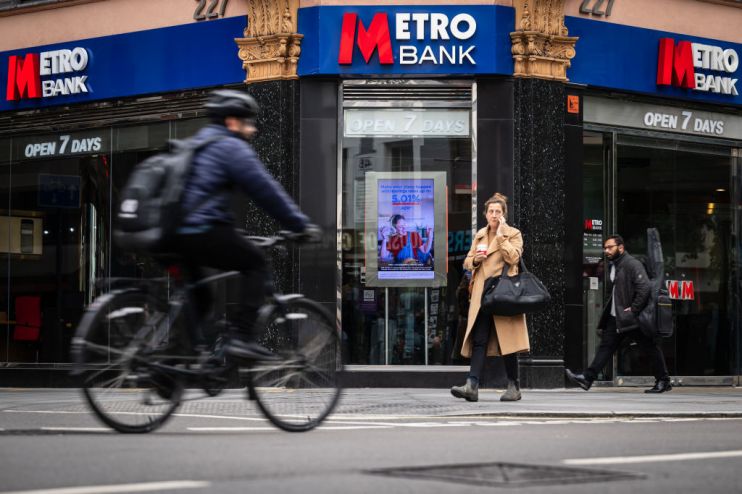
The Notebook: Metro Bank’s cost-cutting drive spells trouble for challengers

Where the City’s brightest get a few things off their chest. Today, our fortnightly columnist Victoria Scholar, head of investment at Interactive Investor, takes the pen.
Challenging times for challenger banks
Metro Bank announced further job losses last week, bringing the total number of cuts to 1,000, representing a 22 per cent reduction in its workforce. The bank is tripling its cost-cutting plans with the aim to achieve another £30m of cost savings this financial year, saving a total of £80m.
Much to the disappointment of its cheerleaders, as part of this plan it is also ending its seven-day branch model, closing on Sundays, reducing daily hours in some branches and switching down to five days a week in many cases.
There was much excitement about the launch of Metro Bank back in 2010 as the first new high street lender in 150 years. It was born out of the chaos of the global financial crisis in 2008-2009 which led to public mistrust in the biggest incumbent lenders. Metro Bank was also going against the grain, focusing on face-to-face customer service at a time when most lenders were shifting away from bricks and mortar branches towards online banking instead.
Shares performed very well in the two years following its IPO in 2016, but it has faced a series of major setbacks since that, sending its shares down by around 96 per cent over the past five years and around 70 per cent over the past twelve months.
There was an accounting scandal in January 2019 which sent shares down by almost 40 per cent in a single session. Last year Metro Bank faced a balance sheet crisis which forced the lender into a £925m refinancing deal. The bank also struggled to make money during the long period of rock bottom interest rates and had difficulties during the challenging pandemic period. There were also fears last year more broadly about challenger banks following the high-profile collapse of Silicon Valley Bank and Signature Bank in the US. The recent takeover announcement of Virgin Money by Nationwide also shows how difficult it is for challenger banks to compete with larger lenders.
In its latest financial results, Metro Bank reported a narrowing full-year underlying loss in 2023 of £16.m. But its outlook remains conservative, highlighting that there are still hard yards ahead for Metro and the broader challenger bank landscape.
China breathes a sigh of relief
China’s industrial production rose by seven per cent in January-February, beating analysts’s expectations for five per cent, rising from a gain of 6.8 per cent in December, and logging the fastest increase in almost two years. Retail sales also surpassed forecasts, growing by 5.5 per cent versus estimates for an increase of 5.2 per cent to mark the 13th consecutive monthly gain. This provides some relief to China’s policymakers who have been battling against a multi-year property crisis, problems with deflation and weak consumer confidence. China has set out an ambitious growth target of five per cent for 2024.
Swooping on Selfridges

Saudi Arabia’s Public Investment Fund (PIF) as well as Gucci and Balenciaga’s luxury conglomerate parent company Kering are reportedly both interested in a stake in Selfridges, according to the Telegraph. This follows the collapse of Signa, a major Selfridges shareholder which owns half of the department store’s property company. Selfridges’s other part-owner, Thailand Central Group, is reportedly looking for a new partner with Saudia Arabia’s PIF among those eyeing a bid. In 2021, Saudi’s PIF took a controlling 80 per cent stake in Newcastle United for £30m.
Debt-ridden Britain
A record 6.7m people in Britain are facing financial difficulty. According to a survey for Debt Justice reported by the Guardian, 13 per cent of adults missed three or more credit or bill payments in the last six months with that figure rising to 29 per cent for 18-24-year-olds. The Guardian said Crosslight Advice, a charity providing debt and money advice in London and the south-east of England, found that inquiries were up by a fifth in the first two months of 2024 versus the same period last year.
Quote of the week
Housing market “seems to be past the bottom”
Rightmove
What I’ve been listening to
One of the items in Chancellor Jeremy Hunt’s briefcase as part of the 2024 Budget was that a new ISA dedicated to UK companies will be made available to UK investors. The ‘British ISA’, which will have a separate £5,000 ISA allowance, is part of government efforts to boost demand for UK businesses. In a recent On The Money episode podcast host Kyle Caldwell and Craig Rickman, personal finance editor at Interactive Investor, detail what is known so far about the British ISA and discuss which types of investments might be eligible.
Another recent episode that’s also well worth checking out looked at how ISA millionaires invest. Kyle and Sam Benstead, deputy collectives editor at Interactive Investor, detailed key trends, explained how long it takes to reach this impressive milestone and revealed the most popular holdings.